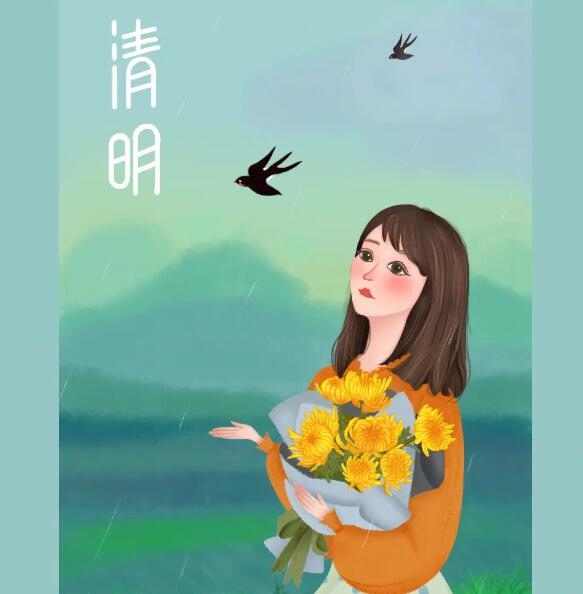清明节来历英文(简短)?
一、清明节来历英文(简短)?
Last Qingming Festival,I return home to worship my grandfather.Qingming Festival is a folk Festival.In the past,the Qingming Festival was called “Arbor Day”。 But Today, Chinese visit their family graves to tend to any underbrush that has grown. Weeds are pulled, and dirt swept away, and the family will set out offerings of food and spirit money. Unlike the sacrifices at a family"s home altar, the offerings at the tomb usually consist of dry, bland food. One theory is that since any number of ghosts rome around a grave area, the less appealing food will be consumed by the ancestors, and not be plundered by strangers. With the passing of time, this celebration of life became a day to the honor past ancestors. Following folk religion, the Chinese believed that the spirits of deceased ancestors looked after the family. Sacrifices of food and spirit money could keep them happy, and the family would prosper through good harvests and more children.望能采纳~亲
二、用英文介绍清明节?
中国清明节的英文介绍:
Brief introduction to the Qingming Festival:
The Qingming or Ching Ming Festival, also known as Tomb-Sweeping Day in English, is a traditional Chinese festival on the first day of the fifth solar term of the traditional Chinese lunisolar calendar. This makes it the 15th day after the Spring Equinox, either 4 or 5 April in a given year.
Qingming has been regularly observed as a statutory public holiday in China. It became a public holiday in China in 2008.
The holiday is associated with the consumption of qingtuan, green dumplings made of glutinous rice and barley grass.
Origin of the Qingming Festival:
The festival originated from the Cold Food Festival ("Hanshi Festival"), established by Chong"er, Duke Wen of Jin, during the Spring and Autumn period. The festival was a memorial for his retainer Jie Zitui,who had loyally followed him during his years of exile. Supposedly, heonce even cut meat from his own thigh to provide Chong"er with soup.Once Chong"er was enthroned as duke, however, Jie considered hisservices no longer required and resigned. Although Duke Wen was generousin rewarding those who had helped him in his time of need, he longpassed over Jie, who had moved into the forest with his mother. Duke Wenwent to the forest in 636 BCbut could not find them. He then ordered his men to set fire to theforest in order to force Jie out. When Jie and his mother were killedinstead, the duke was overcome with remorse and ordered three dayswithout fire to honor Jie"s memory. The city erected over the formerforest is still called Jiexiu (lit. "Jie"s rest").
The Qingming Festival in literature:
Qingming was frequently mentioned in Chinese literature. Among these, the most famous one is probably Du Mu"s poem (simply titled "Qingming"):
三、清明节的句子?
1、愿你清明舒心旸,美满生活似花绽!
2、清明嫩柳总摇曳,难忘暖语殷切。
3、清明节临近,春色入画来。
4、清明悲别离,绵绵无尽期。
5、清明谣,思如清风绕。
6、一年之计在于春,观花赏景踏青行。
7、清明节至,祝你健康平安,顺风顺水,吉祥如意。
8、泪水千行,寄托着对往昔的回忆。
9、又到清明,祝你健康珍重!
10、抛开烦恼舒身心,一路相伴风与景。
11、清明时节雨纷纷,路人不绝扫墓行。
四、清明节语言句子?
清明节是传统的中华民族节日,用来祭祀和缅怀已逝去的先人。以下是一些清明节的语言句子,供您参考:
清明时节雨纷纷,路上行人欲断魂。——唐代杜牧《清明》
春节固其期,清明名其序。——唐代杜甫《清明》
万物生兮众归儒,百事消兮清明祭。——明代龚自珍《己亥杂诗·杂曲歌辞》
秋风落叶寂无声,清明祭祖思万重。——现代王昌龄《清明祭》
君不见黄河之水天上来,奔流到海不复回;君不见高堂明镜悲白发,朝如青丝暮成雪。——唐代杜甫《登高》
此日忆家邦,妻孥成阵行。——宋代陆游《示儿》
黄花池畔草萋萋,墓前松树瘦影低。——元代赵师秀《题袁州龙山县新安王氏墓》
空余露井破,霜入墓松斜。——唐代王建《清明》
今宵酒醒何处?杨柳岸、晓风残月。——宋代苏轼《定风波·三月七日夜湖北省汉江北岸》
小荷才露尖尖角,早有蜻蜓立上头。——唐代郑谷《竹石》
这些语言句子表达了对逝去的先人的缅怀和思念,以及对自然界生命变幻无常的感叹和体悟。
五、清明节损人句子?
人死不能复生,丧葬亦可适度,生活节约光荣,浪费最是可耻还有多少同胞,生活还不富裕,同志仍须努力 一年一年的清明,一年一年的牵挂,一次一次的想念,一分一秒的记忆。
不会忘记,也不会离去,为了身边的,离去的,好好努力,好好珍惜。每当这个日子的来临,总会让人想起一些过去的事情,逝去的人,装载着千丝万缕的思念。如果你真的为他/她好,请你快乐多一点!六、清明节主题句子?
缅怀先人,弘扬中华传统文化是清明节的主题。因为清明节是一年的重要节日,其主要目的是缅怀祖先、祭拜先人,同时也是弘扬中华传统文化的重要场合。清明节时,人们会扫墓、祭祀祖先,表达对先人的怀念和敬意,也流传了许多有关清明的传统习俗和文化。这些文化和习俗的传承弘扬,也成为了清明节的主题之一。此外,清明节也是展示中华文化的良好时机,人们可以在祭拜祖先的基础上,展现中国的传统文化和礼仪。
七、清明节感恩句子?
有很多。明确 清明节是传统节日,感恩是节日重要的主题之一。解释在清明节这一天,人们会去祭拜先人,表达对逝去亲人的思念之情,同时也会反思人生,珍惜眼前的时光,感悟生命的宝贵。这个过程就是一种感恩,感恩逝去的亲人,感恩今天拥有的一切。以下是一些想起过去的事情,感慨生命的短暂,感恩亲人的付出和关爱;清明祭扫,缅怀先人,感恩亲情;感恩生命,感谢当下;感恩亲友,感谢一路有你相伴。
八、有什么清明节文案或者句子推荐吗?
1.春色入酒热,一杯遥寄过往。
2.追思在清明,雨过是天晴。
3.雨纷纷,去那草木深。
4.四野明净,万物皆清明。
5.待烟消雨尽,迎月明风清。
6.花开清明,春过半。
7.清风带走思念,细雨打湿春光。
8.春雨杏花满靖明,追思犹怨水烟轻。
9.相思莫让青烟扰,一束鲜花寄故人。
10.只要眉目舒展,便能看见绿柳如烟。
11.思念如白马,自别离,未停蹄。
12.摘一朵最温柔的花,遥寄最想念的人。
13.可惜,思念无声,幸好,思念无声。
14.生活教人成长,时光教人珍惜。
15.梨花风起正清明,游子寻春半出城。
16.燕归柳荡正清明,出城踏青去寻春。
17.清尘除杂,明空丽水,万物皆洁齐,不负好春光。
18.最是那一抹相思,春色深深。清风明朗,踏青思故。
19.一口青团一口茶,留住暮春好味道。
20.采一朵花,种一棵树,放一只风筝,仰望一朵流云。
九、清明节英文怎么说?
清明节:Tomb-Sweeping Day或者Qing Ming Festival
作为节日和节气的清明节,它们的英文说法是不同的。
作为节日的清明节一般翻译为“Tomb Sweeping Festival”或者“Tomb-sweeping Day”,扫墓节或扫墓日。这个翻译着重强调了清明节的重要习俗“扫墓”。这种说法的好处是,老外一听就能大概明白这个节日的背后含义。
再谈到作为节气的清明,它被译为“Clear and Bright”,清洁和明亮。我们也不难发现,这种译法强调的是清明时节的气候状况,和其他节气的翻译出发点一致。比如立夏被译为“Summer begins”、小寒、大寒分别被译为“Slight cold”和“Great cold”。
清明是二十四节气之一,在仲春与暮春之交,也就是冬至后的第108天。中国汉族传统的清明节大约始于周代,距今已有二千五百多年的历史。
十、关于“清明节”的英文介绍?
Qingming Festival originated from ancestor belief and spring sacrifice custom in ancient times. It has two connotations of nature and humanity. It is not only a natural solar point, but also a traditional festival. 清明节源自上古时代的祖先信仰与春祭礼俗,兼具自然与人文两大内涵,既是自然节气点,也是传统节日。 Qingming Festival is a traditional major spring festival. Tomb-sweeping and ancestor-remembering is a fine tradition of the Chinese nation since ancient times. 清明节是传统的重大春祭节日,扫墓祭祀、缅怀祖先,是中华民族自古以来的优良传统。

